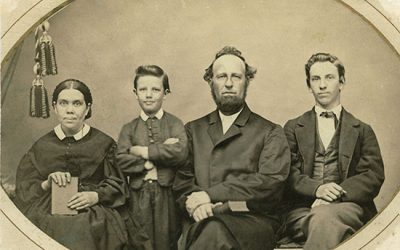The death of a beloved grandma. An unexpected fire that destroys your home. A relationship that dissolves.
How do we handle the grief and ache of these experiences?
The Bible acknowledges the difficult reality of grief. Rather than giving us platitudes, it shows us a God who grieves with us and individuals who also had to navigate grief. As we read about their experiences, we can learn how to walk through it ourselves.
Above all, the Bible is a source of hope we can cling to.
We’ll discover this hope as we cover:
- What causes grief
- Common types of grief
- Examples of grief in the Bible
- How the Bible can help us while we grieve
If you are experiencing grief or looking for ways to comfort your loved ones through their grief, this page will help you do so with God’s Word as your guide.
First, let’s talk about where grief comes from.
What causes grief?

Photo by Danie Franco on Unsplash
Grief occurs when we experience some kind of loss. The Bible gives us a distinct perspective on loss and its role in the human experience because it shows us we’re living in a struggle between good and evil. We have an enemy intent on causing us hurt and loss (John 10:10).
But where did that struggle originate?
Genesis 3 tells us about the moment when loss began.
When Adam and Eve separated themselves from God and sin entered the world, loss entered the world as the devil—the ultimate source of loss—gained access here.
Not only did Adam and Eve have to grieve the loss of their immortality and their position in the Garden of Eden, but God also knew He would have to grieve the death of His own Son to save humanity.
Ever since, we have all had to experience grief in one way or another.
These feelings of loss were never part of God’s plan.
God’s original plan for humanity was for us to live a fulfilling life forever, without pain, suffering, and loss.
And in His lovingkindness, He found a way for this plan to still occur—through His Son Jesus.
Yet until Jesus returns, loss will be rampant in this sinful world. Even the Bible writer Solomon sees mourning as a season in life that comes to all (Ecclesiastes 3:4).
There are many types of grief, and getting a basic understanding of each one can help us understand how to handle it.
What are the different types of grief?
While there is no way we can cover every type of grief, we’ll discuss some primary types:
- Grieving the loss of people
- Grieving the loss of possessions
- Grieving the loss of position
- Grieving the loss of the past
As you read about them, you’ll find that none of these types are isolated. They often overlap with each other.
Grieving the loss of people

Photo by Rhodi Lopez on Unsplash
This is the most obvious form of grief and the one that usually comes to mind first.
Losing someone—such as a family member or a close friend—to death is a major source of grief.
But mourning the loss of someone isn’t only tied to death. It could also occur after a falling out with a friend, an estrangement, or a difficult divorce.
However, grief doesn’t always involve people, as we will see next.
Grieving the loss of possessions
When we grieve physical items in our lives, we’re actually grieving the meaning attached to them—the memories, the associations, and the stability they provided.
This kind of loss often comes with a devastating and traumatic event, such as a robbery, a natural disaster that leads to evacuation, or even job loss.
Some of these things also fall into the next category of grief.
Grieving the loss of position
The loss of position can involve a change in geographical or social position.
Like moving to an unfamiliar place, losing your job or being demoted, or losing a marriage relationship or custody of your children.
These major life changes impact our positions in our lives: the place we identify with, the job that gave us purpose, fatherhood or motherhood, or our role as a boyfriend, girlfriend, husband, or wife.
When the way we live shifts dramatically, we often grieve the loss of both position and identity.
Grieving for the past
This kind of grief brings all the others together. When we mourn for the past, we may be thinking of the people we used to know, the job we used to have, the place we used to live, or the things we used to possess.
We also grieve for ourselves and what our loss has taken away from us, like our health or reputation.
So when we’re in the middle of one or many of these types of grief, what do we do? Scripture gives us examples to validate our grief and show us how to cope with it.
Examples of grief in the Bible
The people in the Bible were human, just like we are. They experienced many different kinds of grief.
The Bible even has an entire book dedicated to grieving:
Lamentations.
The name of the book is itself an ode to grief since it comes from the word lament, which means to express grief or sorrow in a passionate way.
The background to this book is that the people of Jerusalem have experienced all the losses we’ve discussed. They are grieving their lost possessions, city, temple, and loved ones—all of which the Babylonians took from them.
Though we may not be experiencing the same kind of trauma, we can look to the
Israelites to understand that grief is something we all experience.
And it’s never easy.
When we grieve, God can sometimes feel far away, and the Israelites certainly felt that way:
“My soul is bereft of peace; I have forgotten what happiness is; so I say, ‘My endurance has perished; so has my hope from the LORD’” (Lamentations 3:17–18, ESV).
In some of the poetry in Lamentations, God’s people express feelings of abandonment and hopelessness, as many of us do when we lose someone or something important to us.
The book of Lamentations isn’t the only place in Scripture that mentions people grieving.
Several Bible characters grieved in various ways:
- Job lost his children, his health, his possessions, his positions, and, briefly, his faith.
- King David lost loved ones, nearly lost his life, and experienced many crises of faith.
- King Solomon wrote an entire book about the meaninglessness of life and aging. He grieved for his past.
- Elijah lost his faith and even asked God to end his life.
But the story doesn’t end there.
Even when our world seems full of tragedy, God’s Word and His promises are a beacon of hope.
How the Bible helps us through grief

Photo by Humble Lamb on Unsplash
The Bible shows us how to grieve in a healthy way and to eventually embrace hope for the future. It reminds us that overcoming grief is less about cutting the grieving process short and more about finding ways to cope with grief.
Grief isn’t meant to be overcome quickly. It is normal and human to grieve.
So consider the following principles as you walk through this process:
- Claim God’s promises for strength and comfort
- Cry out to God
- Turn to Jesus for empathy
- Share your grief with others
- Find hope for the future in the Word
We’ll expand on each one and see how they’re important to the grieving process.
Please note: If you are struggling with grief that is affecting your ability to function on a day-to-day basis, please seek out a mental health therapist. This page is not meant to take the place of professional help.
Claim God’s promises for strength and comfort
The Bible is full of promises and encouragement that can help us navigate times of grief in life.
When you have a broken heart, the Bible says that God is near to you (Psalm 34:18). He “heals the brokenhearted and binds up their wounds” (Psalm 147:3, NKJV).
When you are sorrowful, the Psalmist says that “weeping may endure for a night, but joy comes in the morning” (Psalm 30:5, NKJV). The grief won’t last forever.
When you need strength to deal with grief and pain, God assures you:
“Fear not, for I am with you; be not dismayed, for I am your God. I will strengthen you, yes, I will help you, I will uphold you with My righteous right hand” (Isaiah 41:10, NKJV).
He welcomes you to rest your grieving soul on Him (1 Peter 5:7), and He will give you peace (Philippians 4:6–7, NKJV).
And in the end, you can acknowledge God’s sustaining grace as the Psalmist did:
“My flesh and my heart fail, but God is the strength of my heart and my portion forever” (Psalm 73:26, NKJV).
He also offers you the courage to face the future beyond loss.
A good example is the case of Joshua after the death of his mentor, Moses. Amid the loss and uncertainty, God came to him and encouraged him to take up the work that Moses had left. God urged him:
“Be strong and of good courage; do not be afraid, nor be dismayed, for the LORD your God is with you wherever you go” (Joshua 1:9, NKJV).
With God on your side, you too can move forward trusting God like David did when he penned these words:
“Though I walk through the valley of the shadow of death, I will fear no evil; for You are with me; Your rod and Your staff, they comfort me” (Psalm 23:4, NKJV).
Armed with these promises, we can come to God and tell Him what we’re going through. That is the next principle.
Cry out to God for healing and comfort
It is not sinful or disrespectful to cry out to God in hopelessness, anger, or need. It’s an essential part of the grieving process. The act of crying out to Him is a way we acknowledge loss so that we can move out of numbness and fully feel our grief.
2 Corinthians 1:3–4 refers to God as the “God of all comfort, who comforts us in all our affliction” (ESV).
And Paul urges us to “come boldly to the throne of grace, that we may obtain mercy and find grace to help in time of need”—all because Jesus understands our sorrow, weakness, and pain (Hebrews 4:14–16, NKJV).
In the Psalms, we find David’s calls to God for help in his distress. Here are examples:
In Psalm 102, David begs God to listen to his cries as he feels his life losing meaning due to his anguish. He says:
“Hear my prayer, O LORD; let my cry come to You! Do not hide Your face from me in the day of my distress! Incline Your ear to me; answer me speedily in the day when I call! For my days pass away like smoke and my bones burn like a furnace” (Psalm 102:1–3, ESV).
In another Psalm, David asks God to consider his tears and remember them:
“You have taken account of my wanderings; put my tears in Your bottle. Are they not in Your book?” (Psalm 56:8, NASB).
When we’ve opened up about our pain to God, we’re then ready for His help and healing.
Turn to Jesus for empathy
Jesus is both an example of grief and hope for the grieving because He, the Savior of the world and Son of God, grieved too. He understands us.
The story of Lazarus’ death is a good example.
In John 11, Jesus hears of the death of His close friend Lazarus, and He grieves for him. It is recorded that “Jesus wept,” even though He has the power to bring him back to life (John 11:35, ESV).
Jesus knows grief.
He has experienced it firsthand.
The prophet Isaiah even described Jesus as a “man of sorrows and acquainted with grief” (Isaiah 53:3, ESV). The passage goes on to say that Jesus bears our grief and carries our sorrows (Isaiah 53:4).
We can depend on Jesus when we are grieving, and we can know that He truly empathizes with us.
He is the ultimate bearer of grief and bringer of hope.
Share your grief with others
Everyone grieves differently. But for many of us, sharing our grief can help us process loss.
In his letter to the church in Galatia, Paul encouraged church members to comfort one another just as Jesus did:
“Carry each other’s burdens, and in this way you will fulfill the law of Christ” (Galatians 6:2, CSB).
We are called to bear each other’s grief, and we have permission to allow others to bear our grief with us.
Finding a support system that will do this is a good way to process grief out loud.
Find hope for the future in the Bible

Photo by Priscilla Du Preez on Unsplash
In our lifetimes, we will almost certainly face grief that feels unbearable, but we can grieve as people who have hope.
Christians believe that a time is coming when all that’s been lost in this world will be restored in the new earth, where we’ll experience eternal life.
Jesus assures us that all who mourn will be comforted (Matthew 5:4).
If you have lost a loved one to death, you can look forward to the Second Coming when those who have died believing in Jesus will rise back to life (1 Thessalonians 4:13–18).
And as Paul puts it, we’ll have new immortal bodies that will never die. In joyful triumph, we’ll shout, “O Death, where is your sting?” (1 Corinthians 15:54–55, NKJV).
Then, “God will wipe away every tear from [our] eyes; there shall be no more death, nor sorrow, nor crying. There shall be no more pain, for the former things have passed away” (Revelation 21:4, NKJV).
If you have lost property or possessions, the Bible promises that all will be restored to you many times over when you walk on the streets of gold. And our home will be in heaven, where Jesus promised, “In My Father’s house are many mansions” (John 14:2, NKJV).
God will sustain us through our times of grieving
In the Bible, we find expressions of grief but also of trust in God’s comfort and soothing presence. He recognizes and understands our pain.
In every situation, He has a word of encouragement to strengthen and carry us through.
One day, Jesus will wipe all tears from our eyes, and we will live together, sorrow free, in a renewed world.
If you are grieving or know someone who is grieving and want to find comfort and healing in the Bible, take a look at these Bible studies.
Choose an Online Bible Study
Want to keep learning? Find out more about Jesus, humanity, the plan of salvation, and how God loves you enough to sacrifice everything, just to give you a chance to choose Him.
Sometimes it can be hard to know where to start, that’s why we offer free, user-friendly, online Bible study options you can do anytime, anywhere, and at your own pace.
This online Bible school will take you through the major themes of Scripture, breaking down the Bible’s complex concepts into bite-sized pieces, which can lead you toward the answers of life’s more challenging questions.
More Answers
Do Adventists Observe Easter-Related Holidays?
Jesus Christ’s resurrection, celebrated on many Easter-related holidays, is central to the beliefs of the Seventh-day Adventist Church. And that means we seek every opportunity to remember it.
An Overview of Seventh-day Adventist Higher Education
The Seventh-day Adventist Church has about 118 tertiary schools around the world. Though many of them are within North America, you’ll also find Adventist universities in countries across the world—places like Croatia, Austria, Brazil, Madagascar, and the Philippines.
The Ten Commandments from a Seventh-day Adventist Perspective
Ever eaten a salad and gotten a big piece of green stuck in your teeth? And you didn’t realize it was there until you looked in the mirror? (Because no one ever told you!)
Major Fulfilled Bible Prophecies You Should Know About
Prophets seem like something from novels or movies. The predictions they make couldn’t actually happen, could they? After all, nobody can tell the future!
What Day Is the Sabbath, and How Do We Know?
The Sabbath is a declaration of weekly rest by God which we find in the Bible (Genesis 2:2-3). But you may be wondering:
Why Do Some Bibles Have More Books Than Others?
Christians consider the Bible as their sacred writings. But within Christianity, different denominations use Bibles with different numbers of books.
Can We Find Jesus Christ In the Old Testament?
Yes, you might be surprised to know that there are hundreds of verses in the Old Testament about Jesus.
What the Bible Says About Resolving Conflicts
While it’s the main ingredient in a good story, it unfortunately can spoil things in real life. It might start from minor differences of opinion. But unchecked, it can turn into what feels like a full-blown war.
The Benefits of A Seventh-day Adventist Academy
Adventist academies are high schools (grades 9-12) that are owned and operated by the Seventh-day Adventist Church.
Are Seventh-day Adventists Christians?
Yes, the Seventh-day Adventist Church is a Protestant Christian denomination formed in 1863. Just like other Christians, we believe that Jesus Christ is our Savior and seek to follow the principles of the Word of God.
Adventist Movies: Where Faith and Film Meet
The Adventist Church uses film to share our faith and uplift positive values. Learn more about specific Adventist-produced films and where to find them.
Does the Bible Teach Predestination?
your choices, actions, and habits really matter to your eternal destiny? Or is the path you choose in life predetermined, and your life is just following a script that’s been laid out for you?
The Seven Churches of Revelation and What They Mean
The seven churches were churches that received messages from Jesus Christ through the apostle John while he was exiled on the island of Patmos. These letters are in chapters 2 and 3 of Revelation.
Do Adventists Celebrate Christmas?
In general, most Seventh-day Adventists do celebrate Christmas.
Since our denomination doesn’t have specific guidelines about holidays, it’s up to each member to decide whether to celebrate it based on their personal convictions and study of the Bible.
How Can I Know Ellen White’s Messages Were From God?
It’s natural to be a bit skeptical when you hear about someone being “divinely inspired,” or that something is a “message from God,” etc. And we expect nothing different if you’re hearing about Ellen White, an influential co-founder of the Seventh-day Adventist Church, for the first time. After all, the Bible tells us that we’re supposed to test these things!
Ellen G. White’s Time in Australia
Ellen White traveled to Australia in the later part of her life, and she ended up spending nine years there. In that time, she helped the Australian Seventh-day Adventist Church increase in size and strength.
Ellen G. White’s Time in Europe
When the Seventh-day Adventist Church was still young, a council of the church in Europe requested Ellen White, one of Adventism’s key leaders, to come to Europe. Despite the many obstacles, God led her there to help the new churches and members for two years.
Ellen G. White’s Travels and Worldwide Mission
Though Ellen White, a co-founder of the Seventh-day Adventist Church, is best known for her ministry in the United States, she also traveled to twelve other countries in her lifetime—a big accomplishment in the 19th century when travel was strenuous and long.
Ellen G. White’s Counsel on College Education
Ellen G. (Harmon) White, a significant co-founder of Adventism, is often known for her practical and spiritual guidance for proper childhood education. But she was also significantly involved in the development of Seventh-day Adventist higher education.
8 Pieces of Advice from Ellen White’s Counsel for Families
In this article, we’ll look at the insight Ellen White received from God. We’ll cover 8 major themes she highlighted for families.
Was Everything Ellen White Said Divinely Inspired?
The Seventh-day Adventist Church believes that many of Ellen White’s messages were inspired by God. But that doesn’t mean everything she ever said was prophetic, or meant to be taken as direct instruction from God. So let’s break down how to identify the nature of her many written messages and quotes.
Who Were Ellen White’s Children?
Being the children of a woman with a prophetic calling from God had its blessings and its challenges.
In this overview, we’ll look at the highlights of the lives of Ellen White’s sons during her many years of ministry, as well as the ways each of them decided to serve Jesus Christ:
Ellen White’s Spiritual Counsel on Marriage
As one of the founders of the Seventh-day Adventist Church, Ellen G. White was held in high regard. She was a prolific author and was heavily engaged in the mission of the denomination, prayerfully pursuing the guidance of the Holy Spirit.
Sabbath Keeping: What It Looks Like in the Bible
That Sabbath would not be about a checklist of rules but about a mindset of rest. It’s a day to set aside daily cares and connect with God, our Creator. Out of our love for Him, we take the principles of the Bible and apply them in the way we keep the Sabbath.
Ellen G. White or the Bible—Which is More Important to Adventists?
Ellen G. White or the Bible—Which is More Important to Adventists?The Bible—without a shadow of a doubt—is the most important book. It’s the standard we use to test all other writings, including those of Ellen White. The Seventh-day Adventist Church believes that “the...
Are Any of Ellen G. White’s Prophecies Yet to Come True?
Ellen White, a co-founder of the Seventh-day Adventist Church, demonstrated many times over that she had the spiritual gift of prophecy. Some of her predictions’ timelines have already passed, and those prophecies have been fulfilled. Others have yet to be fulfilled.
What Was Ellen G. White’s Counsel on Music?
Ellen G. White, one of the founders of the Seventh-day Adventist Church, also provided helpful guidance regarding music choices for Christians. She provided sound principles to answer questions the young Adventist Church had.
What Does the Bible Say About Modesty
Seventh-day Adventists and Christians in general try to ensure their outward presentation and lifestyle glorify God. This often involves daily habits like the ways we hold conversations, the ways we dress and accessorize, and the ways we regard other people when we’re out and about.
Didn’t find your answer? Ask us!
We understand your concern of having questions but not knowing who to ask—we’ve felt it ourselves. When you’re ready to learn more about Adventists, send us a question! We know a thing or two about Adventists.






























